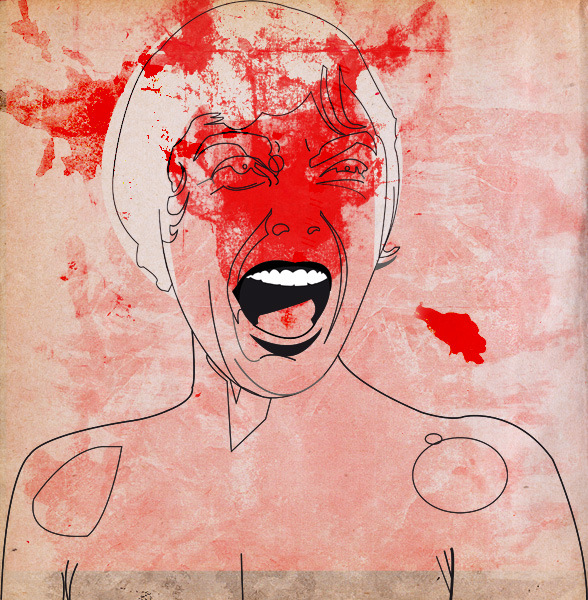They were called Audrey, Chafia, Johanna, Monique, Mauricette. What do all these women have in common? They, and 116 others, were stabbed, burnt, strangled, slaughtered, beaten to death… by their spouse, husband or ex in the year 2019 in France.
The number of femicides in France since the beginning of the year 2019, is 121 as of 16/10/19, but the number grows every week. They were 121 in 2018, which means that we have exceeded the number of femicides compared to the previous year: evidence of a significant systemic problem.
A femicide is: “The murder of a woman or a young girl, because she is a woman.” It is, however, not recognized in the French penal code. In France, the expression officially entered the vocabulary of law and the humanities in 2014, but not in the penal code. According to lawyer Emmanuel Daoud, in the podcast “Pas son genre” on the radio France inter, the integration of “féminicide” in the penal code has lawyers divided. Indeed, for the murder of a woman and a man cannot be distinguished by name in the same way as the murder of a person according to their ethnicity.
There are several types of femicides but we will focus on the “intimate” femicide, committed by the victim’s current or former spouse. According to a study cited by the World Health Organization, more than 35% of women killed worldwide are killed by their partners, compared to only 5% of murders involving men.
WHY? Systemic violence, a patriarchal and sexist society!
A lot of association like Osons le féminisme ! speak about “systemic violence” (character of what is related to a system), and want “féminicide” to be recognized as a “societal fact” when many murders of women are still referred to as “crimes of passion” and relegated to the category of miscellaneous facts.

Systemic violence comes from a sexist and a patriarchal society. In our society women have “always” been considered inferior to men. Gender stereotypes reinforce the appearance of the weak, sweet, gentle woman and the strong men, manly, who think they are justified in abusing their spouse. In 1975, the National Audiovisual Institute (INA) released a video of men’s speeches about the violence they inflict on their spouses. We can hear sentences like: “If I want to hit my wife, I’m sure she will make love better” or, “There are women who like it, I don’t know, out of habit, maybe.” Even if it would be forbidden to have such public discourse, this reality is not so far from view of the number of femicides.
In many cases of femicide, there is domestic violence in the home. The patriarchal violence of judicial and police institutions ignore and diminish situations of violence reducing them to simple “marital disputes” whose violence is normalized. A lot of victims had told the police about the violence they were suffering, and now they are dead.
France is not the only country with a lot of femicide. 43600, this is the number of women and girls killed in 2012 worldwide. Countries such as Romania, Ireland, Finland, Germany and Mexico have the same systemic violence. For several months, thousands of Mexicans have been protesting, on social networks and in the streets, against the authority’s inaction in cases of femicide and sexual violence.
In Spain, since 2003, “machismo violence” has been erected as a great national cause. Faced with the resurgence of this violence in Spain, the socialist government of José Luis Rodriguez Zapatero wanted to strike hard, and put in place measures that today passed in the world. It’s novel in Europe, Spain have put in place a victim support offices, legal and psychological assistance and legal proceedings. Moreover, the government has unlocked an XXL budget to end femicides. The results are that in 2018, 47 women died at the hands of their spouse, compared to 71 in 2003.
So why does the French government not do the same?
Action in France and repression by the government!
Some actions by collectives, such as Noustoutes (“allofus”), Féminicide par son compagnon ou ex (“femicides by our spouse or ex”), or the Femen have been set up.
Féminicide par son compagnon ou ex use a Facebook page to register all the victims of the femicides in France. Noustoutes organized marches, demonstrations, to support, to inform, about the violence and the crimes that undergoes to the women. But nothing has changed in view of the number of femicides that are growing day by day.
A new form of protest has been put in place. Since August, feminist activists have posted them in the streets of Paris. They put up messages such as, “She leaves him, he kills her“, “More listened dead than alive“, or in commemoration of the victims: “Georgette was strangled by her husband the 21.03.19 “ as in the photo below. This movement has now settled in many cities of France.

Célia Maurincomme, feminist activist, who participates in the collage of signs in Lyon, said, “By putting up this sign against femicide, we want to inform people about those murders. And we expect a mobilization of citizens to put pressure on the French state! All this is illegal, we can be taken into custody for putting up posters.“
Many feminist activists have complained about police repression of collages or tags. As said by Célia Maurincomme, police can put you in jail if you put up collages or spray tags on walls about femicides. “One activist put up a sign that said ‘117 femicides, Macron reaction!’ outside of her window because Macron was coming to Lyon. Two armed policemen came to her house and confiscated the sign.” “Some girls were arrested by the police when they put up signs, the police humiliated them, and took their names, addresses, etc.” said C. Maurincomme.
A crackdown is put in place by the government, to punish women who are fighting against their own potential murder. “We’re being killed and you’re talking about tags on walls” said a feminist activist in Mexico.
Saturday 5 October 2019, hundred Femen, demonstrate at the Montparnasse cemetery in Paris. With their skin and hair grayed with clay, wearing messages written on their torso like “I didn’t want to die“, to denounce feminicide and to claim that the government needs “a stronger mobilization.”
Each had a black stele-shaped sign, with the names of women killed by their spouse or ex since the beginning of 2019. They wanted, with this strong act, to call out the “power in place‘,’ explained one of them in a statement. “We recall that most of these women, before being murdered, had been victims of domestic violence and had alerted civil society, police, justice, threats to them.”
by Aimée Niau Lacordaire
Photo credits
Campaign against the femicides in Paris 2019, Célia Maurincomme, All Rights Reserved
0001 by Alvaro Tapia CC BY-NC-ND 2.0
Paris 2019, Ithmus, CC BY 2.0










